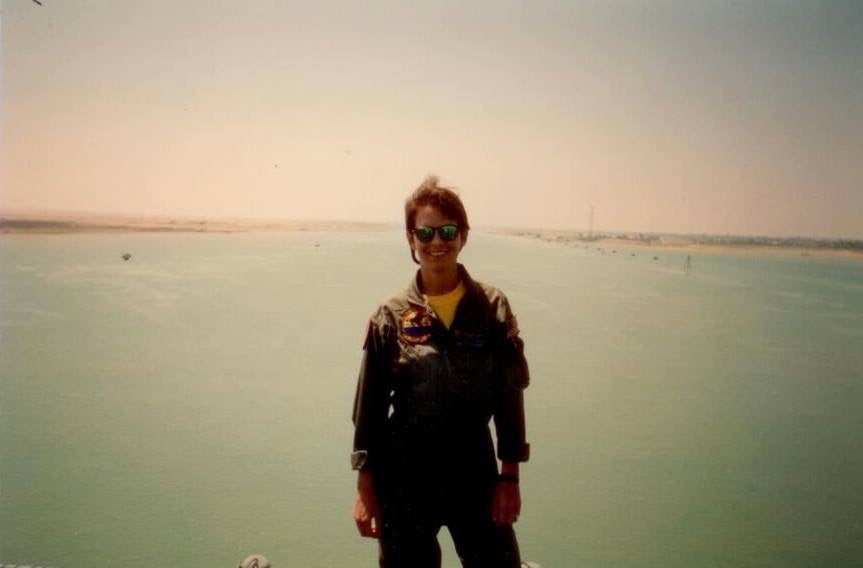Endodontics Resident Dr. Tischke Recalls Service as U.S. Navy Pilot

Introduction
Endodontics Resident Dr. Gail Tischke, ’12, had a very different career before dentistry. She spent two decades as an aviator in the U.S. Navy and Naval Reserves.
“Some people don’t even know the Navy has pilots,” Dr. Tischke said. “People say, ‘Wait, you’re Navy, not Air Force?”
The daughter of a World War II bomber pilot, (her father flew B-25s for the Army Air Corps), Dr. Tischke’s military service began with Aviation Officer Candidate School. From there she completed flight school, earned her Naval Aviator wings, and became a C2 Greyhound carrier pilot. She was deployed on the USS John F. Kennedy and USS George Washington before accepting orders as a station pilot in Key West, FL, followed by orders as an intermediate jet instructor.
A C2 pilot shuttles people, parts, and mail aboard aircraft carriers via arrested landings using the aircraft’s tail hook to “catch a wire.”
“For example, we’d take off from Virginia Beach as the boat [aircraft carrier] was coming from the mainland to Bermuda,” Dr. Tischke explained. “We’d keep hitting the boat—supplying it—until it went out to the Atlantic out of range of land, when we would ride aboard until we were in range of the Azores, where we’d start flying back and forth with cargo again. Basically, we’d follow the boat wherever it was headed and set up an accompanying beach detachment because they didn’t have room onboard to house our planes full time.”
“We did our mission in war and peace,” she said. “If there’s no war the fighter pilots are practicing instead of shooting, but we C2 pilots completed our mission by hitting the boat no matter what.”
Dr. Tischke’s work as a C2 carrier pilot also took her to Spain, Greece, Israel, Egypt, and the United Arab Emirates, to name just a few places. “In the photo, that’s me on the bow of the George Washington going through the ditch—the Suez Canal,” she said.
Her husband, Jim, also is a retired Naval Aviator, who flies for United Airlines. In the second decade of the 2000s, three major airlines declared bankruptcy, including United, and the couple was worried about the future of the airline industry.
“We didn’t know if they were going to survive,” she said. “I had no intention of becoming a dentist, but we needed a plan for an alternative source of income. I have an engineering degree, so I have a science background. I thought about becoming a dentist because it was flexible, would give me a career in science, and would allow me to support the family if it was our only income. United came out of bankruptcy in 2010, but since I was already in dental school at that time, I became a dentist anyway.”
Accepted at both UIC and Midwestern University in Arizona, Dr. Tischke was pleased to pick UIC because not only were she, her husband, and their four children living in the Chicago area, but because she wanted a school in “an urban area with a large patient base,” she said.
While earning her DDS at UIC, she remained in the military, transferring her commission to the National Guard and working as a student recruiter.
“A military career is not for everybody and I was honest with students about that,” Dr. Tischke said. “You have to know what you’re getting into, what you’re signing up for, and what your commitment is.”
After graduating from UIC in 2012, she remained in the National Guard Reserves, finally retiring in December 2012 with 24 years total of military service.
Her military background helps in her dental career, she said.
“My organization and discipline skills were essential in getting through dental school with four kids at home and an airline pilot husband and they apply again as an endo resident,” she said.
The couple’s children are Peter, 23; Mitchell, 21, and Roslyn and John, 16.
Dr. Tischke noted that she had always liked endodontics when she was at the College going for her dental degree and thought about specializing, “but after four years of dental school and with four kids at home, I needed to go out and work for a while,” she said. “I also figured before I committed to two more years of school I wanted to ensure that endo was really what I wanted to do.”
She added, “In general dentistry, you have to keep up on everything, you have to be a jack of all trades. I like to focus on one thing.”
After finishing the endodontics program, “I definitely want private practice,” Dr. Tischke said. “I like the clinician part of dentistry. I would consider teaching, too.
“Some of my classmates didn’t like endo, but I find it fascinating,” she concluded. “I look at endo as every tooth being a puzzle to be mastered. You never know what you’re going to get when you get in there—just like on a carrier run.”